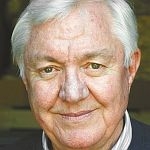 (Host)
(Host)
We are currently being inundated with election polls that often give
conflicting information. But last weekend a poll was published which
commentator and veteran ABC News foreign correspondent Barrie Dunsmore
found to be particularly notable.
(Dunsmore) During my career I
covered elections in many parts of the world. Some were democratic –
numerous others not so much. But in each case I would examine the
country in question with the detachment of an outsider – looking for
ways to explain its politics.
Old habits die hard and I still
try to remain detached when observing the politics of this country. So
this headline of just a few days ago immediately jumped out at me.
"AP POLL: U.S. Majority Have Prejudice Against Blacks."
This
was the lead sentence of this report. " Racial attitudes have not
improved since the United States elected its first black president an
Associated Press poll finds, as a slight majority of Americans now
express prejudice toward blacks whether they recognize those feelings or
not."
This is not a political screed by one side of the current
partisan political wars. The AP, as the creation of a large group of
newspapers of all political stripes, by its very mandate is non
partisan. This particular survey on race in American politics was
conducted with researchers and scholars from Stanford University, the
University of Michigan and the University of Chicago.
This was
its principal finding: 51 percent of Americans now express explicitly
anti-black attitudes, compared with forty-eight percent in a similar
survey in 2008. When measured by an implicit racial attitudes test, the
number of Americans with anti-black attitudes jumped to fifty- six
percent.
This may not be good news, but it is not a surprise.
Going back to the strident arguments between slave and non- slave
holding states as the Constitution was being hammered out in 1787 – with
the slave holders winning key concessions – race has been a major
factor in the American political debate.
But with the election
of the country’s first black president four years ago, I was among those
who expressed hope that the subject of race would truly begin to recede
as a major political issue.
Shortly before the 2008 election,
speaking to a Vermont Human Rights group I said that if candidate Barack
Obama should win, it will be possible to argue that the issue of race
has been transcended – because the biggest taboo in American politics
will have been broken.
However, from the early effort to
challenged the new president’s birthplace and therefore his legitimacy,
to the repeated subtle and not so subtle racial remarks of his opponents
and critics designed to stir up old prejudices, it is clear that I was
overly optimistic four years ago.
Jelani Cobb, professor of
history and director of the Institute for African American studies at
the University of Connecticut, has a wiser perspective. He said
recently," We have this false idea that there is progress and that
things change in one big step. That is not the way history has worked.
When we’ve seen progress, we’ve also seen backlash."
This new AP survey provides the hard data to prove Professor Cobb’s point.